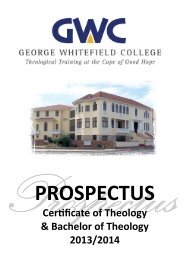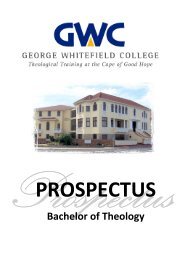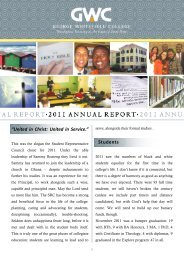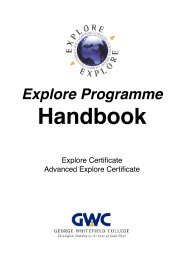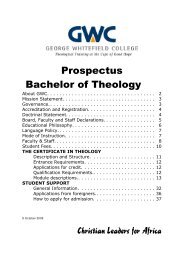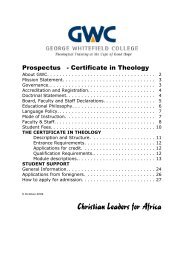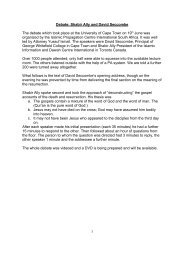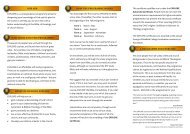Prospectus ? Postgraduate programmes Contents - George ...
Prospectus ? Postgraduate programmes Contents - George ...
Prospectus ? Postgraduate programmes Contents - George ...
Create successful ePaper yourself
Turn your PDF publications into a flip-book with our unique Google optimized e-Paper software.
Module Descriptions<br />
Code Credits Description and Outcomes<br />
Compulsory Modules<br />
DS410/<br />
DS510<br />
16 Doctrine - Patristic Trinitarian Thought: from the New Testament to Augustine<br />
(Robert Doyle)<br />
This subject unit engages the student learner in analytical reading of primary texts in patristic<br />
Trinitarian thought across a range of authors from Tertullian to Augustine. Reading strategies<br />
include identification of the thought structures evident in each text, knowledge of the background<br />
and the contribution of each author to the development of patristic trinitarianism, and critical<br />
reflection on the major exegetical, hermeneutical and systematic theological issues raised by<br />
these texts. In this way, the student is equipped with the resources to evaluate contemporary<br />
theological work, especially in its appeal to classic trinitarian formulations.<br />
Objectives<br />
At the end of the subject unit, students should be able to:<br />
• trace the development of trinitarian thought through the first four Christian centuries<br />
• understand the key issues addressed by the Fathers in relation to the doctrine of God<br />
• evaluate contemporary appropriations of classic Trinitarian theology<br />
These outcomes will be achieved by passing (50%) each component of the assessments:<br />
written critical appreciations of the text, the essay and the examination.<br />
Course Content<br />
• The New Testament foundations of trinitarian thought<br />
• The systematic foundations of Nicaean theology – the creeds of Nicaea and Constantinople<br />
• Strategic, hermeneutical techniques common to pro-Nicene theologians of the 4th century<br />
• The Apologists’ response to charges of atheism and polytheism<br />
• Irenaeus and the beginnings of biblical and systematic Trinitarian thinking<br />
• The alternatives of monarchianism and modalism<br />
• Origen’s Trinitarian contribution and its impact in the Dionysian correspondence<br />
• The ‘Arian crisis’<br />
• Athanasius and the defence of Nicaea<br />
• The Cappadocian contribution<br />
• Augustine’s trinitarian thinking<br />
• John of Damascus<br />
• Contemporary Reappropriation I: Barth & Torrance<br />
• Contemporary Reappropriation II: The Rahnerian critique<br />
• Contemporary Reappropriation III: Gunton & Zizioulas<br />
NT410/<br />
NT510<br />
16 New Testament - Interpretation of Luke (David Seccombe)<br />
This particular course focuses on Luke’s Gospel. It aims at familiarity with the history of and<br />
recent trends in the interpretation of Luke, skill in exegesis of the text of Luke, appreciation of<br />
Luke’s distinctive theology, and understanding of how to make best use of the gospel as a<br />
Christian preacher. Students with Greek prerequisites will be required to work with the Greek<br />
text; others should utilize every aid to get as close as possible to the original text.<br />
Objectives<br />
At the end of this course you should be able to:<br />
To discuss the interpretation of any text of Luke with reference to the original text, its<br />
grammatical meaning, its meaning within the total framework of Luke-Acts, its theological and<br />
historical importance, its place in recent critical debate, and its use in preaching.<br />
To show how Luke presents his main themes.<br />
Give a reasoned view of where Luke’s Gospel fits into the history of early Christianity.<br />
Outline the main stages of the critical study of Luke over the past century and critically discuss<br />
the views of some major contributors to the Luke debates.<br />
26



